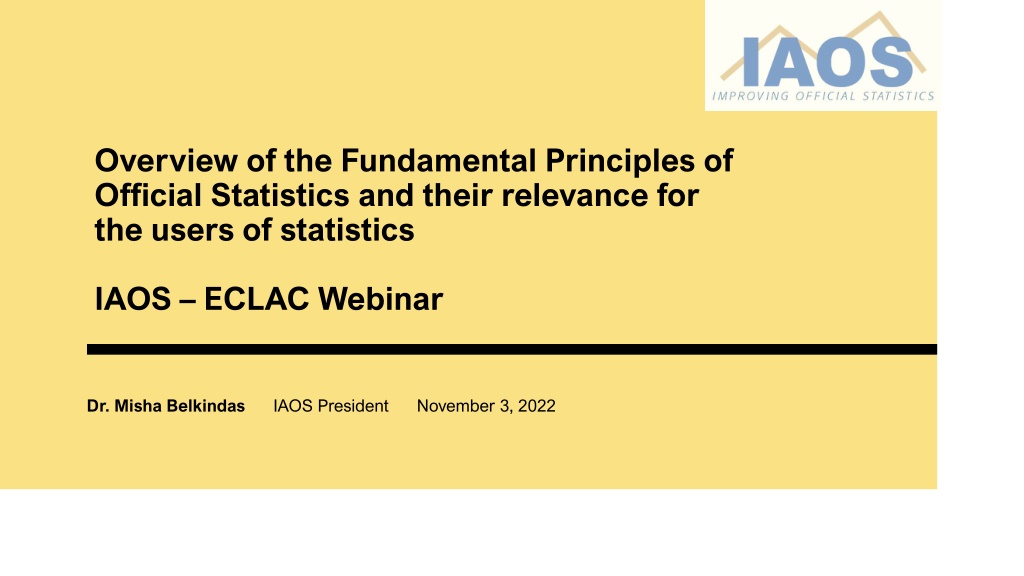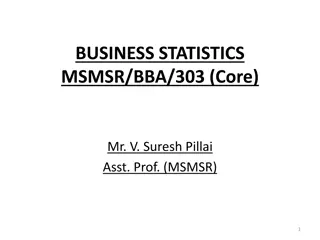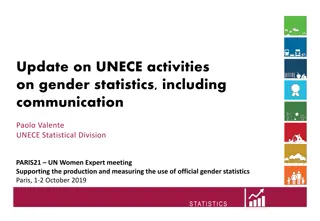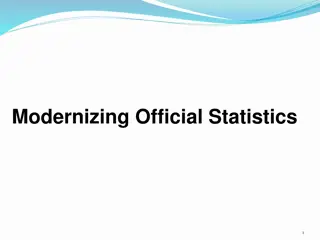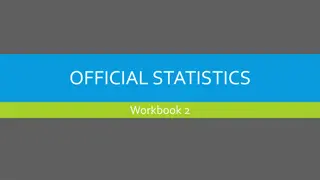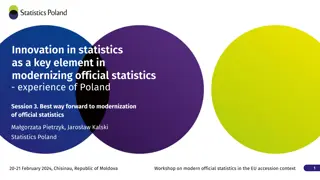Evolution of Fundamental Principles of Official Statistics and Their Global Acceptance
In the late 1980s, the Conference of European Statisticians (CES) initiated discussions to draft the Fundamental Principles of Official Statistics (FPOS) to guide statisticians during transitional periods. Influenced by ethical guidelines, these principles were approved at the UNECE Ministerial level in 1992. Following revisions and endorsements by key UN bodies, the FPOS were globally adopted, emphasizing the crucial role of official statistics in informing democratic societies with impartial and practical data.
Download Presentation

Please find below an Image/Link to download the presentation.
The content on the website is provided AS IS for your information and personal use only. It may not be sold, licensed, or shared on other websites without obtaining consent from the author. Download presentation by click this link. If you encounter any issues during the download, it is possible that the publisher has removed the file from their server.
E N D
Presentation Transcript
Overview of the Fundamental Principles of Official Statistics and their relevance for the users of statistics IAOS ECLAC Webinar Dr. Misha Belkindas IAOS President November 3, 2022
History of Fundamental Principles of Official Statistics (FPOS) In the late 1980s, countries transitioning from centrally planned economies to market economies found that their statistics systems needed reform In 1990, the Conference of European Statisticians (CES) determined to prepare a document on the Fundamental Principles to guide statisticians, particularly in the transition These conversations were influenced by the ISI Declaration on Professional Ethics (1985), the American Statistical Association s Ethical Guidelines for Statistical Practice (1983), and Association des Administrateurs de l'INSEE Code de D ontologie Statistique (1984) Poland led a working group for the CES, with the participation of Bulgaria, France, Romania, Spain, Switzerland, Turkey, Eurostat and the ISI that held three meetings in 1990-1991 to draft the principles In 1991, the CES drafted the Fundamental Principles of Official Statistics (FPOS) The FPOS were approved at the Ministerial level of the UN Economic Commission for Europe (UNECE) in 1992 November 3, 2022 2 History of FPOS
History of Fundamental Principles of Official Statistics (FPOS) (continued) These principles were circulated among other UN regional agencies where they were generally embraced The Fundamental Principles were adopted (with a revised preamble) by the UN Statistical Commission in 1994 In 2011, after revising the preamble, the UN Statistical Commission endorsed the UNFPOS In 2013, the UNFPOS were adopted by the UNECOSOC In 2014, the UNFPOS were adopted by the UN General Assembly In 2024, at the UNFPOS 30th anniversary the UN Statistical Commission will discuss the Fundamental Principles in the new socio-economic environment November 3, 2022 3 History of FPOS
FPOS a Remainder Principle 1 - Official statistics provide an indispensable element in the information system of a democratic society, serving the Government, the economy and the public with data about the economic, demographic, social and environmental situation. To this end, official statistics that meet the test of practical utility are to be compiled and made available on an impartial basis by official statistical agencies to honour citizens' entitlement to public information Principle 2 - To retain trust in official statistics, the statistical agencies need to decide according to strictly professional considerations, including scientific principles and professional ethics, on the methods and procedures for the collection, processing, storage and presentation of statistical data Principle 3 - To facilitate a correct interpretation of the data, the statistical agencies are to present information according to scientific standards on the sources, methods and procedures of the statistics Principle 4 - The statistical agencies are entitled to comment on erroneous interpretation and misuse of statistics November 3, 2022 4 History of FPOS
FPOS a Remainder (continued) Principle 5 - Data for statistical purposes may be drawn from all types of sources, be they statistical surveys or administrative records. Statistical agencies are to choose the source with regard to quality, timeliness, costs and the burden on respondents Principle 6 - Individual data collected by statistical agencies for statistical compilation, whether they refer to natural or legal persons, are to be strictly confidential and used exclusively for statistical purposes Principle 7 - The laws, regulations and measures under which the statistical systems operate are to be made public Principle 8 - Coordination among statistical agencies within countries is essential to achieve consistency and efficiency in the statistical system Principle 9 - The use by statistical agencies in each country of international concepts, classifications and methods promotes the consistency and efficiency of statistical systems at all official levels Principle 10 - Bilateral and multilateral cooperation in statistics contributes to the improvement of systems of official statistics in all countries November 3, 2022 5 History of FPOS
Data Revolution and the New Data Ecosystem The SDG era and the new emerging statistical ecosystem New actors private sector, civil society organizations, academia Role of the government The system is comprised not of producers only The important role of data users - governments, journalists, businesses and the society at large The changing role of NSO from a single data producer to a data steward November 3, 2022 6 History of FPOS
Misuse of Statistics and Trust in Statistics The new role of NSOs put an additional burden on them to be the guardians of FPOS in the country The new role also puts additional burden to earn the trust IAOS has created a Krakow Group to deal with those issues worldwide The IAOS response on misuse of statistics and mistreatment of statisticians The case of El Salvador November 3, 2022 7 History of FPOS
IAOS Cares and is Worried about FPOS IAOS discussed the FPOS in a special day long session at the IAOS conference in Krakow in April 2022 A few quotes from participants of the session: FPOS is the compass for Ethical Spirit, Credibility, Identity & Trust. It is a reference to all National Statistical Offices working under crises and uncertainty. Nevertheless, Fundamental Principles needs a full review to keep up with never preceding challenges and engage new data terminology including data science, data interoperability, modernization, data stewardship Broadening the scope of the FPOS to other actors beyond official statistics can be an enriching experience and can provide us all with more tools to react to many attacks to them by some political systems, creating the basis for their full compliance The Fundamental Principles are (1) more universal (2) more needed and (3) more fundamental than ever. The best 30-year birthday present for the principles would be a collective and broadened understanding of just HOW fundamental and foundational they are and how the grand the edifice of statistics, data and information is that they are supporting November 3, 2022 8 History of FPOS
Thank You In case of questions, please communicate to Dr. Misha Belkindas mishabelkindas@opendatawatch.com November 3, 2022 9 History of FPOS
